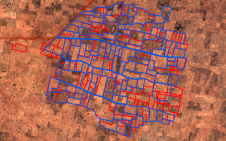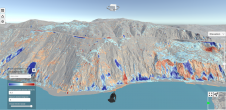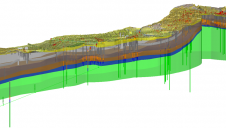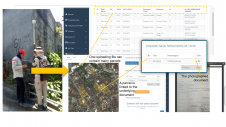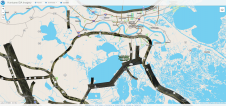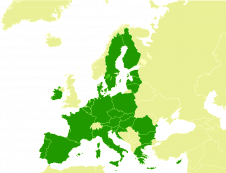从Covid-19出现
What Will Shape the Geospatial Industry?
Which exciting opportunities lie ahead as the geospatial industry emerges from the COVID-19 pandemic? And what other influences are shaping the future of our sector?
The geospatial industry has been more fortunate than others – such as hospitality and tourism – during the COVID-19 pandemic. In fact, there are some exciting opportunities relating to accelerating the digital transformation so that businesses can adapt to the ‘new normal’ and economic stimulus packages with a greater emphasis on green growth. Furthermore, the health sector, which has long failed to exploit the potential of geospatial, has started to recognize its value. This article examines these and other influences that are likely to shape the future of the geospatial industry.
The COVID-19 pandemic has provided a warning about the very real risk of new crises of unforeseen nature emerging in the future. At a time when healthcare systems are under unprecedented pressure, geospatial solutions have proved essential in crisis management by supporting analysis of how the virus is being spread and by whom, as well as logistical challenges such as where personal protective equipment (PPE) is being manufactured and what supply chain is required to get it to where it is needed.
Personal privacy vs public health
As various public inquiries look at what their own nations could have done better, they will look East. Countries such as South Korea enacted legislation allowing government use of data from smartphones, social media and ride-sharing apps to help understand and control the spread of infection. Experience with SARS and, more recently, MERS led to democratic governments in the region overcoming privacy concerns and enacting laws to authorize emergency use of such data for public health purposes. In the West, we already trust our governments to collect and use – in strictly protected ways – vast amounts of our personal data during population censuses. The way they anonymize such data is well established and effective. So why, in the developed democracies of Europe, can we not trust our legislators to put in place such temporary measures for health emergencies?
Digital transformation
The most profound long-term change is likely to be the acceleration of the digital transformation, not only as underpinned by European Union declarations, but recognized globally. The rise of Zoom seems to have made companies more accepting of remote working almost overnight, resulting in a significant structural impact on the configuration of cities and public transport networks. The increasingly pervasive use of the term ‘artificial intelligence’ (AI) to underpin all use of advanced software engineering, whilst a troubling misappropriation of the term, does point to where geospatial can contribute to adapting to such change. An increasing interest in geoAI in the finance sector, for instance, will be part of a move to make better use of alternative sources of data for ‘decisioning’ on investment options. Another facet of digital transformation will be the increased use of drones. Surveyors may not be allowed to visit sites to undertake their work and crews cannot travel to a site together, but sending up a drone is OK. With less air traffic, aerial surveys around the busiest airports have also become easier.
Social and economic damage
随着世界走出大流行,巨大的年代ocial and economic costs will start to hit individual businesses and their employees. It has clearly been necessary for governments to substantially increase sovereign debt for job retention and other business support schemes, but that money will have to be paid back. Interest rates are currently low and the repayment periods for strong economies are relatively long. However, the danger is that inflationary pressures will grow as suppliers rack up prices to recover losses suffered during the pandemic.
最新公告公共部门工人的薪水是预测公共投资和税收上升的预测。随着公共部门组织估计占供应方地地理空间公司销售额的50%,这将影响收入。188asia备用网址例如,数字双胞胎项目可能会有所放缓,这些项目通常是由城市当局赞助的,因为随着资源转移到社会护理的转移,可酌情支出。由于生活模式的变化,新的大型建筑项目的减少可能会加剧这种情况。人们对更多外部居住空间的渴望将在未来十年内看到城市的人口减少以及卫星城镇中较小的发展的兴起。大多数地理空间公司的办公空间需求将改变,因为转向“ WeWork”模型以保持社区精神,并且随着面对面的会议的举188asia备用网址行频率较低,离家较近。这种变化将伴随着大量的办公空间供住宅或其他用途。
Silver linings
然而,悬挂在基础设施领域的云层有一线希望。欧盟绿色协议将推动对具有积极环境概况的项目的大量投资。这不仅对地球有益,而且还可能刺激对环境影响评估的广泛需求。农业的绿化将产生对更加精确的地球观测数据的需求。除此之外,全球金融行动工作组(FATF)建议的实施将意味着金融机构将不得不报告与气候相关的风险,这是监管机构施加的压力测试的一部分。总的来说,目前对金融机构投资的资产的位置的了解相对较差。这将需要改进以满足这些要求。空间融资计划是有关地理空间公司这个潜在巨大市场的进一步信息的良好来源。188asia备用网址它将需要对地球观察和人类地理(统计,流动性,地址)以及机器学习在大量数据中的应用进行复杂的整合。咨询服务公司目前正在与卫星申请的联合报告有关该主题将于2021年初发布的该主题。
Market opinion
In the summer of 2020, ConsultingWhere conducted an opinion survey to test sentiment in the industry on prospects over the next few years. The respondents were mostly UK-based and represented about 100 separate organizations with a reasonably even spread, from small and medium-sized enterprises (SMEs) to large multinationals.
This was the third in a series of surveys and revealed some interesting results. COVID-19 is currently having a significant impact on the markets in which the respondents operate. Only 33% expected revenue growth in 2020, compared to 47% expecting their revenues to grow in 2021 and 70% in 2022. In the pre-COVID-19 survey in early 2020, 62% were expecting substantive growth over each of the following three years.
Sectoral contrasts
Based on the survey, there has also been a sharp change in the patterns of expected growth by sector. The survey indicates that more stable private sectors such as energy, telecoms and water are still expected to expand, as are central government, health and emergency services. On the other hand, sectors which are typically more sensitive to consumer behaviour are expected to contract – particularly retail but also construction, property and consumer mapping. Figure 1 summarizes the findings, organized from left to right in increasing confidence in future growth. Sectors with relatively high sensitivity to consumer behaviour predominate on the left of the chart, whilst those markets with lower reliance on consumer disposable incomes are shown on the right.

Timeline comparison
When the three recent surveys are viewed together, signs of the disruption to the upward trend in confidence become more clearly visible. Figure 2 compares the average expected growth rate by sector across the three surveys. In the 2017 survey, only two sectors were expected to contract – central government and local government – whereas a broad array of sectors are now expecting to suffer reduced demand over the next three years, some of which had high growth expectations in 2020.
Private sector
这些数据将新th的前景e more stable private sectors. Water, energy, transport and telecoms all show that growth levels have been cut from their pre-COVID-19 levels but by much less than their more cyclical counterparts. Each expects to remain positive in terms of overall market opportunity. Even within this seemingly homogenous grouping, there are subtle differences in the underlying responses. More respondents indicated that growth in transport was likely to be greater than 10%, better than in any of the other three sectors. This may reflect the potential for increased geospatial involvement in the growing market of delivery and collection businesses resulting from the move towards online shopping.

Public sector
199年后,只有卫生部门的平均增长率比以前更高。中央政府部门一直保持着自2017年以来所累积的一些收益,但预期的预期增长率下降了。这很可能反映出与医疗保健相似的因素,因为医疗保健的关注越来越大。对地方政府支出的悲观主义持久。
Conclusion
In summary, it is likely that the geospatial industry will prosper from the changes – both temporary and permanent – that are occurring as the world emerges from the pandemic. To use the current jargon, many businesses will need to ‘pivot’ their business models to focus on different sectors. This will involve moving out of their comfort zone to engage customers in new sectors and exploit the wide range of new technological advances coming out of the research community. If the industry does not adapt quickly, for sure others will move in to ‘eat our lunch’.
进一步阅读
https://ec.europa.eu/isa2/news/eu-member-states-sign-sign-berlin-declaration-digital-society_en
Make your inbox more interesting.Add some geo.
Keep abreast of news, developments and technological advancement in the geomatics industry.
Sign up for free

